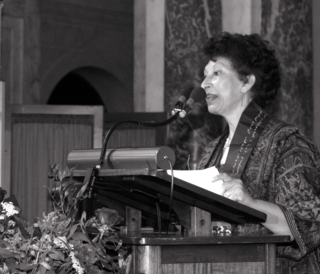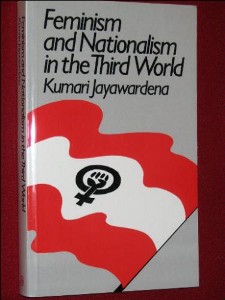
Fatema Mernissi was a Moroccan feminist writer and sociologist.

Christina Marie Hoff Sommers is an American author and philosopher. Specializing in ethics, she is a resident scholar at the American Enterprise Institute. Sommers is known for her critique of contemporary feminism. Her work includes the books Who Stole Feminism? (1994) and The War Against Boys (2000). She also hosts a video blog called The Factual Feminist.
Postcolonial feminism is a form of feminism that developed as a response to feminism focusing solely on the experiences of women in Western cultures and former colonies. Postcolonial feminism seeks to account for the way that racism and the long-lasting political, economic, and cultural effects of colonialism affect non-white, non-Western women in the postcolonial world. Postcolonial feminism originated in the 1980s as a critique of feminist theorists in developed countries pointing out the universalizing tendencies of mainstream feminist ideas and argues that women living in non-Western countries are misrepresented.

Lesbian feminism is a cultural movement and critical perspective that encourages women to focus their efforts, attentions, relationships, and activities towards their fellow women rather than men, and often advocates lesbianism as the logical result of feminism. Lesbian feminism was most influential in the 1970s and early 1980s, primarily in North America and Western Europe, but began in the late 1960s and arose out of dissatisfaction with the New Left, the Campaign for Homosexual Equality, sexism within the gay liberation movement, and homophobia within popular women's movements at the time. Many of the supporters of Lesbianism were actually women involved in gay liberation who were tired of the sexism and centering of gay men within the community and lesbian women in the mainstream women's movement who were tired of the homophobia involved in it.

Womanism is a feminist movement, primarily championed by Black feminists, originating in the work of African American author Alice Walker in her 1983 book In Search of Our Mothers' Gardens. Walker coined the term "womanist" in the short story "Coming Apart" in 1979. Her initial use of the term evolved to envelop a spectrum of issues and perspectives facing black women and others. Walker defined "womanism" as embracing the courage, audacity, and self-assured demeanor of Black women, alongside their love for other women, themselves, and all of humanity. Since its inception by Walker, womanism has expanded to encompass various domains, giving rise to concepts such as Africana womanism and womanist theology or spirituality.
Feminist legal theory, also known as feminist jurisprudence, is based on the belief that the law has been fundamental in women's historical subordination. Feminist jurisprudence the philosophy of law is based on the political, economic, and social inequality of the sexes and feminist legal theory is the encompassment of law and theory connected. The project of feminist legal theory is twofold. First, feminist jurisprudence seeks to explain ways in which the law played a role in women's subordinate status. Feminist legal theory was directly created to recognize and combat the legal system built primarily by the and for male intentions, often forgetting important components and experiences women and marginalized communities face. The law perpetuates a male valued system at the expense of female values. Through making sure all people have access to participate in legal systems as professionals to combating cases in constitutional and discriminatory law, feminist legal theory is utilized for it all.
Susan Brownmiller is an American journalist, author and feminist activist best known for her 1975 book Against Our Will: Men, Women, and Rape, which was selected by The New York Public Library as one of 100 most important books of the 20th century.

Islamic feminism is a form of feminism concerned with the role of women in Islam. It aims for the full equality of all Muslims, regardless of gender, in public and private life. Islamic feminists advocate for women's rights, gender equality, and social justice grounded in an Islamic framework. Although rooted in Islam, the movement's pioneers have also utilized secular, Western, or otherwise non-Muslim feminist discourses, and have recognized the role of Islamic feminism as part of an integrated global feminist movement.
Phyllis Chesler is an American writer, psychotherapist, and professor emerita of psychology and women's studies at the College of Staten Island (CUNY). She is a renowned second-wave feminist psychologist and the author of 18 books, including the best-sellers Women and Madness (1972), With Child: A Diary of Motherhood (1979), and An American Bride in Kabul: A Memoir (2013). Chesler has written extensively about topics such as gender, mental illness, divorce and child custody, surrogacy, second-wave feminism, pornography, prostitution, incest, and violence against women.

Feminism and Nationalism in the Third World is a 1986 publication by Sri Lankan author Kumari Jayawardena. Kumari's book has been described as a feminist classic and widely used in gender and women's studies to date as a primer of Third-World Feminism.
Black feminism is a branch of feminism that focuses on the African-American woman's experiences and recognizes the intersectionality of racism and sexism. Black feminism philosophy centers on the idea that "Black women are inherently valuable, that liberation is a necessity not as an adjunct to somebody else's but because of our need as human persons for autonomy."

Barbara Smith is an American lesbian feminist and socialist who has played a significant role in Black feminism in the United States. Since the early 1970s, she has been active as a scholar, activist, critic, lecturer, author, and publisher of Black feminist thought. She has also taught at numerous colleges and universities for 25 years. Smith's essays, reviews, articles, short stories and literary criticism have appeared in a range of publications, including The New York Times Book Review, The Black Scholar, Ms., Gay Community News, The Guardian, The Village Voice, Conditions and The Nation. She has a twin sister, Beverly Smith, who is also a lesbian feminist activist and writer.
Saba Mahmood (1961–2018) was professor of anthropology at the University of California, Berkeley. At Berkeley, she was also affiliated with the Center for Middle Eastern Studies, Institute for South Asia Studies, and the Program in Critical Theory. Her scholarly work straddled debates in anthropology and political theory, with a focus on Muslim majority societies of the Middle East and South Asia. Mahmood made major theoretical contributions to rethinking the relationship between ethics and politics, religion and secularism, freedom and submission, and reason and embodiment. Influenced by the work of Talal Asad, she wrote on issues of gender, religious politics, secularism, and Muslim and non-Muslim relations in the Middle East.

Kimberlé Williams Crenshaw is an American civil rights advocate and a scholar of critical race theory. She is a professor at the UCLA School of Law and Columbia Law School, where she specializes in race and gender issues.

Meredith Jane Tax was an American feminist writer and political activist.
Multiracial feminist theory refers to scholarship written by women of color (WOC) that became prominent during the second-wave feminist movement. This body of scholarship "does not offer a singular or unified feminism but a body of knowledge situating women and men in multiple systems of domination."
White feminism is a term which is used to describe expressions of feminism which are perceived as focusing on white women while failing to address the existence of distinct forms of oppression faced by ethnic minority women and women lacking other privileges. Whiteness is crucial in structuring the lived experiences of white women across a variety of contexts. The term has been used to label and criticize theories that are perceived as focusing solely on gender-based inequality. Primarily used as a derogatory label, "white feminism" is typically used to reproach a perceived failure to acknowledge and integrate the intersection of other identity attributes into a broader movement which struggles for equality on more than one front. In white feminism, the oppression of women is analyzed through a single-axis framework, consequently erasing the identity and experiences of ethnic minority women in the space. The term has also been used to refer to feminist theories perceived to focus more specifically on the experience of white, cisgender, heterosexual, able-bodied women, and in which the experiences of women without these characteristics are excluded or marginalized. This criticism has predominantly been leveled against the first waves of feminism which were seen as centered around the empowerment of white middle-class women in Western societies.
Feminism in Pakistan refers to the set of movements which aim to define, establish, and defend the rights of women in Pakistan.This may involve the pursuit of equal political, economic, and social rights, alongside equal opportunity. These movements have historically been shaped in response to national and global reconfiguration of power, including colonialism, nationalism, Islamization, dictatorship, democracy, and the War on Terror. The relationship between the women's movement and the Pakistani state has undergone significant shifts from mutual accommodation to confrontation and conflict.

Sex Object: A Memoir is a 2016 memoir and the sixth book written by Jessica Valenti. Valenti shares personal stories recounting her childhood and adolescence regarding her treatment as a sex object and the pernicious influence of sexism in her daily encounters. She paints an image of an adult whose identity has been shaped by these experiences. Valenti argues that most women face a similar reality of being shaped by—and making everyday decisions to minimize—male aggressions and sexual assault. Valenti was able to use Sex Object: A Memoir as a platform to focus on sharing experiences with readers, helping them understand how prevalent sexism is for young girls and women, and shedding light on the sheer size of this cultural problem.

Development Alternatives with Women for a New Era (DAWN) is a transnational feminist network of scholars, researchers and activists from the global South. DAWN works under the gender, ecology and economic justice (GEEJ) framework, which highlights the linkages between these three advocacy areas. The network offers a forum for feminist advocacy, research, and analysis on global social, political, and economic issues affecting women, with a focus on poor and marginalized women of the global South. This was a shift from the association of feminism with white, middle-class women of the global North common at the time of DAWN’s formation and into the present-day. Rafia Zakaria, author of Against White Feminism: Notes on Disruption, argues that DAWN and its empowerment approach to development offer a successful example of a bottom-up, antiracist alternative to political mobilization that decentres the whiteness prominent in dominant feminist development projects.










